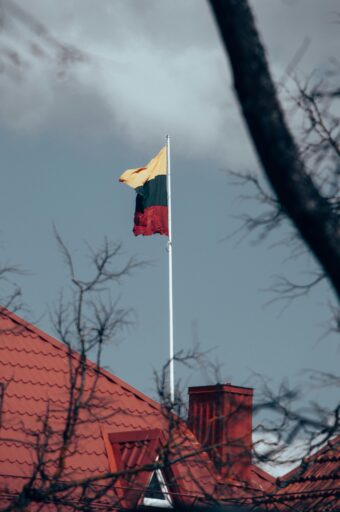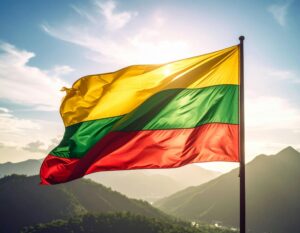Lithuania offers a pathway to reclaim nationality through ancestry, allowing descendants of Lithuanian citizens to restore their ties to the country.
Lithuania citizenship by descent is available to those with parents, grandparents, or even great-grandparents who were Lithuanian citizens before 1940.
This guide covers:
- How does the Lithuanian citizenship law work?
- Who is eligible for Lithuanian citizenship by descent?
- Can great grandchildren claim Lithuanian citizenship?
- Is Lithuanian a strong passport?
My contact details are hello@adamfayed.com and WhatsApp +44-7393-450-837 if you have any questions.
The information in this article is for general guidance only. It does not constitute financial, legal, or tax advice, and is not a recommendation or solicitation to invest. Some facts may have changed since the time of writing.

What is the Lithuanian citizenship by descent law?
Lithuanian citizenship by descent is governed by the Lithuanian Citizenship Law, which outlines the rules for reclaiming nationality through ancestry.
The law allows individuals of Lithuanian origin to acquire or restore citizenship if they can prove direct descent from an ancestor who held Lithuanian citizenship before June 15, 1940, the date when Soviet occupation began.
This framework was specifically introduced to recognize the historical injustices of forced migration, exile, and war that caused many Lithuanians and their descendants to lose their nationality.
It ensures that children, grandchildren, and in some cases great-grandchildren, can reconnect with their Lithuanian roots.
The law has undergone several amendments over the years, most notably to clarify dual citizenship rights and to make the application process clearer for the global Lithuanian diaspora, many of whom emigrated to the United States, South America, or Western Europe during the 20th century.
What if my ancestor left Lithuania before 1918?
Lithuanian citizenship by descent only applies if the ancestor was a citizen of Lithuania after its independence was declared in 1918.
If your ancestor emigrated before 1918, they were never citizens of the modern Lithuanian state and therefore cannot pass citizenship by descent.
How to apply for Lithuanian citizenship by descent
The application is made through the Migration Department of Lithuania or a Lithuanian consulate abroad.
The process typically involves:
- Collecting ancestor’s Lithuanian birth, marriage, or residency records.
- Providing your own birth and marriage certificates to establish lineage.
- Submitting translated and apostilled documents.
- Applying online or through the nearest consulate.
Most cases require professional genealogical research to locate Lithuanian records from archives.
Who qualifies for Lithuanian citizenship by descent?
Eligibility typically applies to:
- Parent, grandparent, or great-grandparent connection – If any of these relatives were Lithuanian citizens before 1940, you may reclaim citizenship. Unlike some countries, Lithuania extends eligibility up to great-grandparents, which broadens the scope for many applicants.
- Ancestor’s migration history – Your ancestor must have left Lithuania due to persecution, occupation, or voluntary migration. For example, many Lithuanians who emigrated to the US, Canada, Brazil, or Argentina in the early 20th century still pass on eligibility to their descendants.
- Proof of lineage – Applicants must provide official records such as birth, marriage, or death certificates that establish the family connection. This documentation must show an unbroken chain from you back to the Lithuanian ancestor.
How long does it take to become a citizen in Lithuania by descent?
The processing time varies, but most applications take 12–24 months depending on the complexity of documents and whether additional archival research is required.
In some cases, straightforward applications with complete documents are approved in under a year.
How much does it cost to get Lithuanian citizenship?
On average, obtaining Lithuanian citizenship by descent costs between €500 and €3,000, depending on the complexity of your case. The official government application fees are relatively low, usually €100–€200.
Most of the expenses come from gathering documentation, notarization, apostilles, translations, and legal or genealogical assistance.
Applicants who already have well-preserved family records may only pay a few hundred euros, while those needing professional research or legal support often spend in the higher range.
For many in the Lithuanian diaspora, these costs are seen as a worthwhile investment given the benefits of EU citizenship, including mobility, work rights, and access to healthcare and education.
Does Lithuania allow dual citizenship?

Yes, but only in specific cases. Descendants reclaiming Lithuanian citizenship are generally permitted to hold dual citizenship.
However, applicants through naturalization usually must renounce their previous nationality.
How good is a Lithuanian passport?
The Lithuanian passport is consistently ranked among the world’s strongest travel documents, placing it in the top 10 globally.
As of 2025:
- Henley Passport Index – Lithuania offers visa-free or visa-on-arrival access to around 181 countries, putting it on par with several Western European nations, ranked as top 11.
- Arton Capital Passport Index – Lithuania ranks highly at 7 due to both travel freedom and the ability to hold dual citizenship in many cases.
- Nomad Capitalist Passport Index – Beyond mobility, Lithuania ranks well at 29because it combines EU membership with favorable tax opportunities, quality of life, and strong expat appeal.
What are the benefits of Lithuanian citizenship by descent?
Key benefits include:
- EU mobility and settlement rights – As a Lithuanian citizen, you gain full European Union rights, which means you can live, work, study, or retire in any EU/EEA country without needing residency permits. This is one of the strongest appeals for global professionals, entrepreneurs, and families.
- Healthcare and education access – Lithuanian citizens can benefit from world-class public healthcare systems and access subsidized or free education across the EU, opening doors for both personal and family opportunities.
- Reconnection with heritage – For members of the Lithuanian diaspora, particularly those whose families emigrated during or after World War II, citizenship by descent provides a way to reclaim cultural identity and strengthen ties to ancestral roots.
- Business and investment opportunities – Citizenship opens the EU single market, allowing entrepreneurs to start or relocate businesses within any EU member state. It also provides greater access to trade, banking, and tax advantages across the bloc.
- Security and global mobility – Beyond Europe, the Lithuanian passport provides visa-free or visa-on-arrival travel to nearly 190 countries, making it one of the most convenient passports for international mobility.
How hard is it to get a Lithuanian citizenship?
Although Lithuania isn’t among the countries with easiest citizenship to get, Lithuanian citizenship by descent is considered easier than naturalization because it does not require long-term residence, language exams, or integration tests.
Instead, eligibility is based on proving your ancestry and your ancestor’s Lithuanian citizenship status before 1940.
That said, the process can still be complex. Applicants must provide official documents—such as birth, marriage, and migration records—often across multiple generations, and these may need translation, apostilles, or legalization to be accepted.
One of the unique advantages of Lithuania’s program is its broad generational scope.
Unlike many countries that limit descent to parents or grandparents, Lithuania often allows claims through parents, grandparents, and even great-grandparents, provided the family link and pre-1940 Lithuanian citizenship can be clearly documented.
This wide generational limit makes it accessible to many members of the Lithuanian diaspora worldwide, though the level of difficulty ultimately depends on the availability and accuracy of historical records.
Conclusion
Lithuania citizenship by descent offers one of the broadest ancestry-based pathways in Europe, extending eligibility up to great-grandparents.
While the process is easier than naturalization, it still requires careful documentation and proof of lineage before 1940.
For many in the global Lithuanian diaspora, this program is not just a legal opportunity but also a way to reconnect with heritage while gaining the full benefits of EU citizenship, including mobility, education, healthcare, and global travel freedom.
FAQs
Can Jews get Lithuanian citizenship?
Yes. Many Jewish families with Lithuanian roots qualify for Lithuanian citizenship by descent if they can prove an ancestor held Lithuanian citizenship before 1940.
This includes those whose ancestors emigrated due to persecution, war, or exile.
What is the certificate of Lithuanian descent?
The certificate of Lithuanian descent is an official document issued by Lithuanian authorities confirming that a person has Lithuanian ancestry.
It is often required as supporting evidence when applying for citizenship by descent.
Does Lithuania have birthright citizenship?
Yes. Lithuania grants citizenship by birth if at least one parent is a Lithuanian citizen at the time of the child’s birth, regardless of where the child is born.
However, being born in Lithuania without Lithuanian parents does not automatically give citizenship.
Pained by financial indecision?

Adam is an internationally recognised author on financial matters with over 830million answer views on Quora, a widely sold book on Amazon, and a contributor on Forbes.



